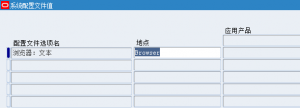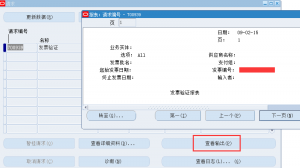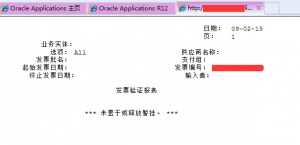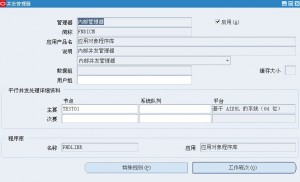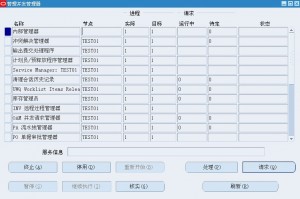SELECT FCR.FUNCTION_NAME,
FCR.DESCRIPTION,
FCR.TRIGGER_EVENT,
FCR.TRIGGER_OBJECT,
FCR.CONDITION,
FCR.ENABLED,
FCR.FIRE_IN_ENTER_QUERY,
FCR.RULE_TYPE,
FCR.FORM_NAME,
FCS.LEVEL_ID,
FCS.LEVEL_VALUE
FROM APPLSYS.FND_FORM_CUSTOM_RULES FCR,
APPLSYS.FND_FORM_CUSTOM_SCOPES FCS,
APPLSYS.FND_FORM_CUSTOM_ACTIONS FCA
WHERE FCR.ID = FCS.RULE_ID(+)
AND FCR.ID = FCA.RULE_ID(+);
分类目录归档:系统层级
并发请求日志输出方式改变
Oracle EBS技术分类列表
在Oracele EBS中,需要掌握的常用技术如下列表(摘自深入浅出系列之workflow):
1. Oracle DB
关系型数据库,其实是最佳的设计模式和开发框架;所有MIS系统的基础,最可靠的数据持久存储
2. PL/SQL
标准SQL+编程语言,Oracle所有开发工具的基石,用于业务逻辑实现,系统质量的优劣、性能的高低,很大程度上取决于PL/SQL
3. Reports
过去流行的可视化报表设计环境,开发效率高,数据检索+报表展现,尤其是单据打印
4. Discoverer
BI展现工具,基于主题视图,分析企业数据;因为布局工作量小,被广泛应用于普通报表开发
5. ADI/Web ADI
从日记账和FA起家,逐步发展为EBS最强的桌面工具;数据检索+Excel展现、数据批量录入和修改
6. XML Publisher
基于XML工业标准,数据抽取与展现分离,布局设计平易近人又高度灵活丰富,与Java亲密集成;数据检索+报表展现,除了单据打印,还可发布至合作伙伴
7. Concurrent
基于时间的任务并发、排队,合理利用系统资源;立即、定时或周期执行程序、报表、维护和监控
8. Flexfield
EBS最富特色的自定义字段,智能组合、智能验证;会计科目、物料分类,业务特有信息的记录和传递
9. Forms
最快捷的数据库应用系统开发环境,UI不够友好; Windows版的数据录入+数据处理+数据检索
10. JSP/JTF/OAF
效率比较高的基于浏览器的应用开发框架;纯Web版的数据录入+数据处理+数据检索
11. Workflow
灵活的流程定义/自动化、通知发送、系统间集成;流程式审批、流程式数据传递、事件式系统集成
12. Alert
基于触发器和定时器的数据监控、预警通知;企业核心数据监控、系统运行异常监控
13. Interface/API
各模块开发人员留出的,除了UI外的数据"出入口";客户化业务、外围系统与核心ERP的集成
14. Web Service
基于Internet的计算和服务,可用于数据交换;跑在Internet上的Interface/API
PLSQL TNS单双接点配置实例
以下例子中的IP和实例名均是随意所为。
单节点:
LLKU=
(DESCRIPTION =
(ADDRESS_LIST =
(ADDRESS = (PROTOCOL = TCP)(HOST = 10.0.0.1)(PORT = 1521))
)
(CONNECT_DATA =
(SERVICE_NAME = LLKU)
)
)
双节点:
LLKU=
(DESCRIPTION =
(ADDRESS = (PROTOCOL = TCP) (HOST = 10.0.0.1)(PORT = 1521))
(ADDRESS = (PROTOCOL = TCP) (HOST = 10.0.0.2)(PORT = 1521))
(LOAD_BALANCE = yes)
(CONNECT_DATA =
(SERVER = DEDICATED)
(SERVICE_NAME =LLKU)
)
)
EBS内部管理器节点问题(克隆后)
在项目上遇到这样一个情况,从一个有双节点的EBS环境中克隆的一套系统测试系统的时候,当时在测试一个报表的时候出现警告,看日志说是内部管理器有问题,我就依此找到了内部管理器,发现内部管理器节点为空,于是找同事帮忙,定义新的节点,路径为:系统管理员/并发/管理器/定义/,定义方法相信接触的EBS的人都知道的,最后重新启动adcmctl.sh应用服务即可。非正常内部管理器和定义内部管理器如下图所示:
users reports back that reports are not running with no manager error (see below), and when you check manager status, all managers have Description- Target Node/Queue Unavailable
Solution One:
1. . Run the following in SQL*Plus:
SQL> EXEC FND_CONC_CLONE.SETUP_CLEAN;
COMMIT;
EXIT;
2. Run AutoConfig on all tiers, firstly on the DB tier and then the APPS tiers, to repopulate the required system tables.
Db Tier:
cd $ORACLE_HOME/appsutil/scripts/<inst>/adautocfg.sh
Apps Tier:
cd $ADMIN_SCRIPTS_HOME/adautocfg.sh
Solution Two:
1. Run cmclean.sql with Apps tier down
2. restart all services and check
Solution Three (if All else fails, check all the details below:)
SQL> select node_name,target_node,control_code from fnd_concurrent_queues;
SQL> update apps.fnd_concurrent_queues set node_name = ‘Node NAME’ where node_name=’Existing Node Name’;
SQL> select NODE_NAME,NODE_MODE,STATUS from fnd_nodes;
SQL> select control_code,target_node,node_name,CONCURRENT_QUEUE_NAME from fnd_concurrent_queues;
SQL> UPDATE fnd_concurrent_queues set control_code = null;
SQL> select TARGET_NODE,NODE_NAME from fnd_concurrent_queues where node_name='<Existing Node Name>’;
SQL> select TARGET_NODE,NODE_NAME from fnd_concurrent_queues where TARGET_NODE='<Existing Node Name>’;
SQL> update fnd_concurrent_queues set NODE_NAME='<Node Name>’ where NODE_NAME='<Source/Existing Node Name>’;
SQL> update fnd_concurrent_queues set TARGET_NODE='<Node Name>’ where TARGET_NODE='<Source/Exixting Node Name>’;
SQL> UPDATE fnd_concurrent_queues set target_node = ‘<Node Name>’;
SQL> UPDATE fnd_concurrent_queues set node_name = ‘<Node Name>’;
SQL> Commit;
SQL> select control_code,target_node,node_name,CONCURRENT_QUEUE_NAME from fnd_concurrent_queues;
SQL>select TARGET_NODE,NODE_NAME from fnd_concurrent_queues where node_name='<Node Name>’;
SQL>select TARGET_NODE,NODE_NAME from fnd_concurrent_queues where TARGET_NODE='<Node Name>’;
Solution four:
SQL> set linesize 1000;
SQL> column CONTROL_CODE format A15
SQL> select CONCURRENT_QUEUE_NAME, CONTROL_CODE , TARGET_NODE, NODE_NAME from FND_CONCURRENT_QUEUES where concurrent_queue_name like ‘OAMGCS_%’;
Sample Output:
CONCURRENT_QUEUE_NAME CONTROL_CODE TARGET_NODE NODE_NAME
—————————— ————— —————————– ——————————
OAMGCS_SUPTEBSAL1 E SUPTEBSAL1
To implement the solution, please execute the following steps:
1. Please set control_code to null for the OAMGCS concurrent queue on the specific node that is affected by this issue.
SQL> update FND_CONCURRENT_QUEUES
set control_code = null
where concurrent_queue_name = ‘OAMGCS_<hostname>’; <Ur Existing Node Name>
2. Make sure the Target_node is correct for the OAMGCS manager:
SQL> update FND_CONCURRENT_QUEUES
set TARGET_NODE='<correct node >’
where CONCURRENT_QUEUE_NAME=’OAMGCS_<hostname>’;
SQL> commit;
References:
Conflict Resolution Manager Shows Target Node/Queue Unavailable [ID 732709.1]
OAM Generic Collection Service shows State: “The target node/queue unavailable”. [ID 393706.1]
After Cloning all the Concurrent Managers do not start for the cloned Instance [ID 555081.1]
Conflict Resolution Manager Shows Target Node/Queue Unavailable [ID 732709.1]
Concurrent Managers Do Not Start After Cloning Nodes Not Updated In Conc_queues [ID 466532.1]
Summary of Possible Reasons and Solutions for the Problem Where All Concurrent Requests Stuck in Pending Phase [ID 182154.1]
Output Post Processor is Down with Actual Process is 0 And Target Process is 1 [ID 858813.1]
Using Load-Balancers with Oracle E-Business Suite Release 12 [ID 380489.1]
Documentation For Specific Load Balancer Hardware [ID 727171.1]
Sharing The Application Tier File System in Oracle E-Business Suite Release 12 [ID 384248.1]
Add new node to application —- 384248.1
Common Error: Concurrent Manager shows “Target Node/Queue Unavailable “
